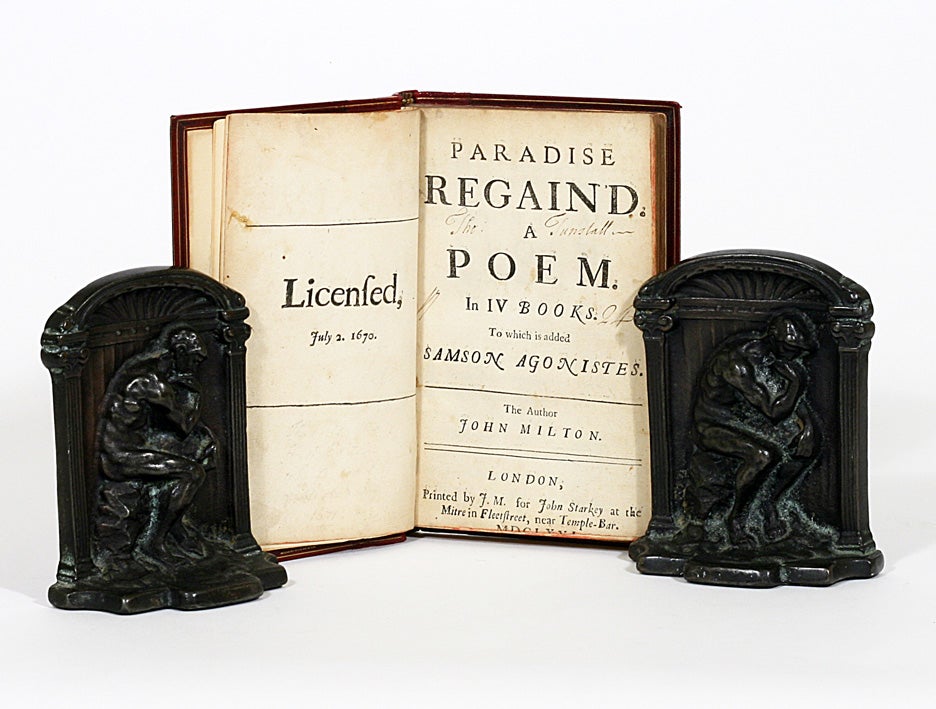PARADISE REGAINED: A Brief into the Four Books of John Milton's Classical Epic after Paradise Lost

Did you know that Paradise Regained is a companion piece to Paradise Lost, and that the former dramatizes the temptation of Jesus Christ and the fall of Satan?
Paradise Regained is a brief epic in four books composed by John Milton, one of his last two poems published in one volume in 1671. Paradise Regained was followed by Samson Agonistes, a dramatic poem not intended for the stage. Milton composed Paradise Regained at his cottage in Chalfont St Giles in Buckinghamshire. Paradise Regained is four books long and comprises 2,065 lines; in contrast, Paradise Lost is twelve books long and comprises 10,565 lines.
Paradise Regained is connected by name to his earlier and more famous epic poem Paradise Lost, with which it shares similar theological themes; indeed, its title, its use of blank verse, and its progression through Christian history recall the earlier work. However, this effort deals primarily with the temptation of Christ as recounted in the Gospel of Luke.
Paradise Regained hearkens back to the Book of Job, whose principal character is tempted by Satan to forgo his faith in God and to cease exercising patience and fortitude in the midst of ongoing and ever-increasing adversity. By adapting the trials of Job and the role of Satan as tempter and by integrating them with the accounts of Matthew and Luke of Jesus’ temptations in the wilderness, Milton dramatizes how Jesus embodies Christian heroism.
Less sensational than that of Classical protagonists and not requiring military action for its manifestation, Christian heroism is a continuous reaffirmation of faith in God and is manifested in renewed prayer for patience and fortitude to endure and surmount adversities. By resisting temptations that pander to one’s impulses toward ease, pleasure, worldliness, and power, a Christian hero maintains a heavenly orientation that informs his actions.
Satan as the tempter in Paradise Regained fails in his unceasing endeavours to subvert Jesus by various means in the wilderness. As powerful as the temptations may be, the sophistry that accompanies them is even more insidious.
In effect, Paradise Regained unfolds as a series of debates—an ongoing dialectic—in which Jesus analyzes and refutes Satan’s arguments. With clarity and cogency, Jesus rebuts any and all arguments by using recta ratio, always informed by faith in God, his father. Strikingly evident also is Jesus’ determination, an overwhelming sense of resolve to endure any and all trials visited upon him.
Though Paradise Regained lacks the vast scope of Paradise Lost, it fulfills its purpose admirably by pursuing the idea of Christian heroism as a state of mind. More so than Paradise Lost, it dramatizes the inner workings of the mind of Jesus, his perception, and the interplay of faith and reason in his debates with Satan. When Jesus finally dismisses the tempter at the end of the work, the reader recognizes that the encounters in Paradise Regained reflect a high degree of psychological verisimilitude.
In Book 1, Jesus is baptized by John. Satan, seeing this, calls a meeting of demons to plot against him, confident he can fool Christ as he fooled Adam. Meanwhile God tells the angels Satan is overconfident, and they sing God's praise. Jesus enters the wilderness and fasts there for 40 days, pondering His past and future. A seeming old man of the desert asks him as Son of God to turn stones into bread. Jesus, recognizing Satan, rebukes him for his lies. Satan pretends to be delighted to hear truth and begs permission to stay. Jesus says he can do whatever the Father in heaven allows. Night falls.
In Book 2, Simon and Andrew saw Jesus baptized and realize He is Messiah, but lose Him and search for Him. They worry they have lost Him for good. Mary too wonders what has become of her Son, remembering that she lost him once before when He was 12. Satan returns to his demons, warning them this temptation is going to be far more difficult than the fall of man. Belial advises using a honey trap, but Satan knows this will not work, thinking pride a stronger test. Jesus, hungry, dreams of Elijah being fed by ravens. Waking, he finds a fair man and a banquet waiting for Him, but He again resists. Satan next tries to tempt with money, but Jesus reminds him that King David started as a mere shepherd.
In Book 3, Satan flatters Christ, praising His wisdom, then taunts Him with his lack of achievement, saying Alexander the Great had conquered half the world at 30. Jesus rejects gaining glory by violent means. Satan next tries goading him with duty, saying Judas Maccabeus gained glory for God by fighting the pagans. But Jesus sees suffering as the path he must tread. Satan then takes Christ to a high mountain, showing Him the kingdoms of the world. He suggests He will need an alliance with the Parthians if He is to resist Rome successfully. Christ refuses Satan's suggestion to free the Ten Tribes, leaving it to divine providence.
Finally, in Book 4, Satan next shows Christ Rome, and offers it to Him. Christ once more rejects. Satan says all the kingdoms of the world are his to bestow if only Christ will bow the knee. Christ rebukes him for this blasphemy, quoting Exodus chapter 20. Satan, realizing he is defeated, makes an attempt to interest Christ in the wisdom of Ancient Greece. But Jesus rejects this in favour of the Psalms and the Prophets. Satan angrily returns Christ to the wilderness and forces him to spend a cold night in the middle of a Tempest amid hellish furies. Christ endures this. Satan, frustrated, takes Christ to Jerusalem and tells him to throw himself off the pinnacle of the Jewish Temple, quoting a Psalm. Jesus quotes back, "Tempt not the Lord thy God". Satan falls. Angels help Jesus, singing of his victory over the devil, feeding Him, and returning him to Mary.
Sources: Wikipedia | Britannica
#penglobalentertainment



